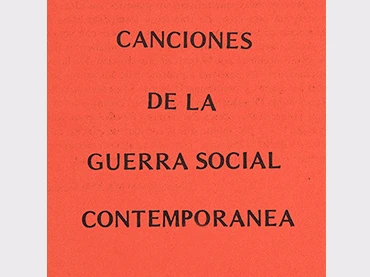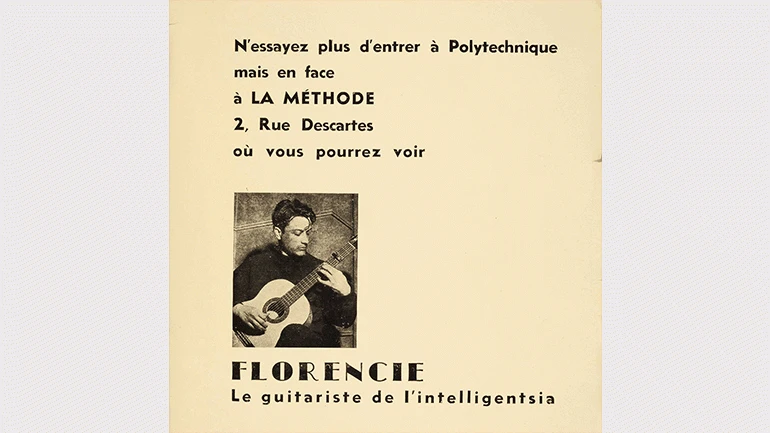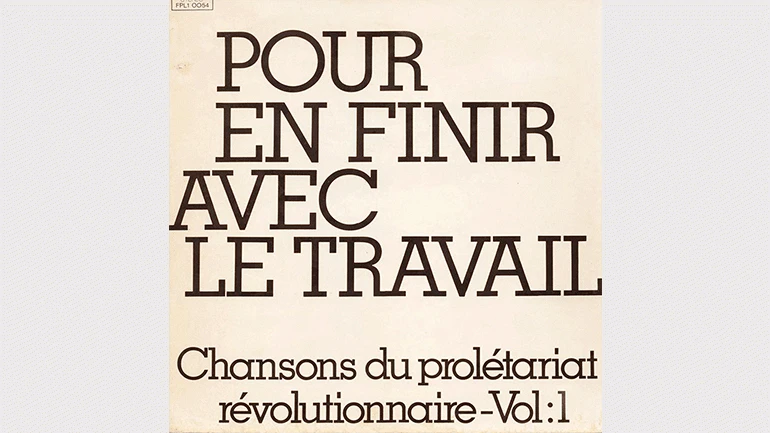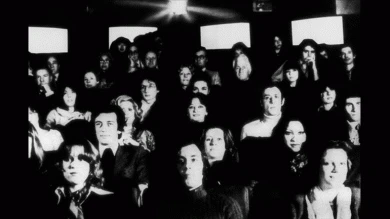-
21 February - 15 November 2020 Museo Reina Sofía and Círculo de Bellas Artes
Guy Debord and René Viénet, from Lettrism to Situationism
Film Is Dead: If You Want, Let’s Proceed to the Debate


Songs of the Contemporary Social War. Cover of the pamphlet under the same title. Signed “Some iconoclasts”, 1981
Held on 15 Nov 2020
Songs of the Contemporary Social War is the title of a pamphlet made by Guy Debord, signed anonymously under the pseudonym “Some iconoclasts” and dated May 1981. The project, which began to take root before 1968, involved editing a popular Iberian song book, in a similar fashion to the one made by Federico García Lorca with La Argentinita in 1931, which would bear witness to contemporary political transformations in Spain. In this concert, the song book is performed live by three choirs and an ensemble of contemporary artists on video.
The twelve songs published in the pamphlet are devoted to the struggles of the Autonomous Movement, a splintered political movement from communism in the 1970s and 1980s and one that took up the tenets of May ’68 during the Transition to democracy in Spain. The songs were conceived as a recording that was supposed to be made by Mara — also known as Mara Jerez and her flamenco youths — who had been the first soloist to accompany Paco Ibáñez. The singer turned down the project, just as the different groups of Autonomía Obrera (Workers’ Autonomy) did after questioning its relevance. The recording and circulation of the book sought to raise money for a common fund to help prisoners from the Autonomous Movement in Spain who were being held in Segovia Prison for participating in actions undertaken by different Anti-Franco groups, for instance Movimiento Ibérico de Liberación-Grupos Autónomos de Combate (the Iberian Movement of Liberation-Autonomous Combat Groups, MIL-GAC), Ejército Revolucionario de Ayuda a los Trabajadores (the Revolutionary Army to Aid Workers, ERAT) and the Comandos Autónomos Anticapitalistas (Autonomous Anti-Capitalist Cells), among others.
In a letter to Guillermo González García, to whom a version of Ya se van los pastores para Extremadura (The Shepherds Are Heading to Extremadura) is devoted here, Guy Debord addressed the issue that arose between disseminating the cause and its ideas and the possibility of it simply involving another “leftist artistic spectacle” – a debate that remains open. In fact, Miguel Amorós and Jaime Semprún, spokespeople of the French theorist in this pamphlet, have voiced their scepticism on numerous occasions after seeing how the fetishism of Situationist commodities took their different productions of agitation — pamphlets, publications, films — to art spaces or museum display cases. In fact, it is that political nature that brings about its circulation in cultural spaces which, in no way a separate sphere, are also political; places which can become conductors of dissidence and with the capacity to mutate into “temporarily autonomous spaces” in which clear gestures of politicisation operate.
Yet Debord’s project would also take its own path: first, running the La Méthode café with Michèle Bernstein in 1958, where these forms of popular détournement (a Situationist technique translated as ‘drift’ or ‘derailment’) were carried out by figures such as Federico García Lorca. The different factions also continued during the Spanish Civil War and after, when Debord discovered the Cádiz Carnival during one of his spells in Spain. Second, with the publication of the album Pour en finir avec le travail. Chansons du prolétariat révolutionnaire – Vol. 1 (To Finish with Work. Songs of the Revolutionary Proletariat, 1974), a collaboration between Guy Debord, Alice Becker-Ho, Raoul Vaneigem and Jacques Le Glou. And, finally, with the collection of unreleased songs, many composed alongside the film project De l’Espagne, which in the end Debord would never undertake.
In this edition Songs of the Contemporary Social War is accompanied by the performances of three choirs committed to feminism, anti-racism and anti-capitalism, in addition to video versions by different artists. The concert, a coda to the series Guy Debord and René Viénet, from Lettrism to Situationism. Film Is Dead: If You Want, Let’s Proceed to the Debate, seeks to recover recollections of this little-known project and revitalise the work of the Situationists of the past and the different groups pertaining to Autonomía Obrera, genuinely forgotten in the “Spanish reality of the neo-democratic period”, as Debord put it.
Force line
Avant-gardes
Collaboration
The Museo Reina Sofía Education Department
Organised by
Museo Reina Sofía and Círculo de Bellas Artes
With the sponsorship of
Credits
Length: 60’
Texts: Guy Debord
Concept and artistic direction: Pedro G. Romero
Documentation and production: María García and Isaías Griñolo.
Video production: Andrés Duque, Isaías Griñolo, María Salgado and Fran MM Cabeza de Vaca
Participating artists in the videos: María Salgado and Fran MM Cabeza de Vaca, Niño de Elche with Los Planetas, Julio Jara, Tomás de Perrate, Proyecto Lorca, María Marín and Javiera de la Fuente with José Ismael Sierra
Live vocal performances: El CoroFón, Coro de Mujeres Malvaloca and Coro Intercultural Voces de Ida y Vuelta
Choir conductors: Alejandra Barella, Carina Brezzi and Guillermo González (El CoroFón); Guayarmina Calvo (Coro de Mujeres Malvaloca and Coro Intercultural Voces de Ida y Vuelta), and Cristina Mora Barranco (Coro Intercultural Voces de Ida y Vuelta)
Musical arragements: Sonia Megías



Más actividades

Aesthetics of Peace and Desertion Tactics
8 October 2025 – 24 June 2026
The study group Aesthetics of Peace and Tactics of Desertion: Prefiguring New Pacifisms and Forms of Transitional Justice proposes a rethinking—through both a theoretical-critical and historical-artistic lens—of the intricate network of concepts and practices operating under the notion of pacifism. A term not without contestation and critical tension, pacifism gathers under its name a multiplicity of practices—from anti-militarism and anti-war movements to non-violence activism—while simultaneously opening urgent debates around violence, justice, reparation, and desertion. Here, pacifism is not conceived as a moral doctrine, but as an active form of ethical and political resistance capable of generating aesthetic languages and new positions of social imagination.
Through collective study, the group seeks to update critical debates surrounding the use of violence and non-violence, as well as to explore the conflict of their representation at the core of visual cultures. In a present marked by rearmament, war, genocide, and the collapse of the social contract, this group aims to equip itself with tools to, on one hand, map genealogies and aesthetics of peace—within and beyond the Spanish context—and, on the other, analyze strategies of pacification that have served to neutralize the critical power of peace struggles. Transitional and anti-punitive justice proposals will also be addressed, alongside their intersections with artistic, visual, and cinematic practices. This includes examining historical examples of tribunals and paralegal activisms initiated by artists, and projects where gestures, imaginaries, and vocabularies tied to justice, reparation, memory, and mourning are developed.
It is also crucial to note that the study programme is grounded in ongoing reflection around tactics and concepts drawn, among others, from contemporary and radical Black thought—such as flight, exodus, abolitionism, desertion, and refusal. In other words, strategies and ideas that articulate ways of withdrawing from the mandates of institutions or violent paradigms that must be abandoned or dismantled. From feminist, internationalist, and decolonial perspectives, these concepts have nourished cultural coalitions and positions whose recovery today is urgent in order to prefigure a new pacifism: generative, transformative, and radical.
Aesthetics of Peace and Tactics of Desertion, developed and led by the Museo Reina Sofía’s Studies Management, unfolds through biweekly sessions from October to June. These sessions alternate between theoretical discussions, screenings, work with artworks and archival materials from the Museo’s Collection, reading workshops, and public sessions. The group is structured around sustained methodologies of study, close reading, and collective discussion of thinkers such as Judith Butler, Elsa Dorlin, Juan Albarrán, Rita Segato, Sven Lütticken, Ruth Wilson Gilmore, and Franco “Bifo” Berardi; historical episodes such as the anti-nuclear and anti-arms race movement in Spain; and the work of artists and activists including Rojava Film Commune, Manuel Correa and the Oficina de Investigación Documental (Office for Documentary Investigation), and Jonas Staal, among other initial cases that will expand as the group progresses.

Institutional Decentralisation
Thursday, 21 May 2026 – 5:30pm
This series is organised by equipoMotor, a group of teenagers, young people and older people who have participated in the Museo Reina Sofía’s previous community education projects, and is structured around four themed blocks that pivot on the monstrous.
This fourth and final session centres on films that take the museum away from its axis and make it gaze from the edges. Pieces that work with that which is normally left out: peripheral territories, unpolished aesthetics, clumsy gestures full of intent. Instead of possessing an institutional lustre, here they are rough, precarious and strange in appearance, legitimate forms of making and showing culture. The idea is to think about what happens when central authority is displaced, when the ugly and the uncomfortable are not hidden, when they are recognised as part of the commons. Film that does not seek to be to one’s liking, but to open space and allow other ways of seeing and inhabiting the museum to enter stage.

Intergenerationality
Thursday, 9 April 2026 – 5:30pm
This series is organised by equipoMotor, a group of teenagers, young people and older people who have participated in the Museo Reina Sofía’s previous community education projects, and is structured around four themed blocks that pivot on the monstrous.
The third session gazes at film as a place from which to dismantle the idea of one sole history and one sole time. From a decolonial and queer perspective, it explores films which break the straight line of past-present-future, which mix memories, slow progress and leave space for rhythms which customarily make no room for official accounts. Here the images open cracks through which bodies, voices and affects appear, disrupting archive and questioning who narrates, and from where and for whom. The proposal is at once simple and ambitious: use film to imagine other modes of remembering, belonging and projecting futures we have not yet been able to live.

Remedios Zafra
Thursday March 19, 2026 - 19:00 h
The José Luis Brea Chair, dedicated to reflecting on the image and the epistemology of visuality in contemporary culture, opens its program with an inaugural lecture by essayist and thinker Remedios Zafra.
“That the contemporary antifeminist upsurge is constructed as an anti-intellectual drive is no coincidence; the two feed into one another. To advance a reactionary discourse that defends inequality, it is necessary to challenge gender studies and gender-equality policies, but also to devalue the very foundations of knowledge in which these have been most intensely developed over recent decades—while also undermining their institutional support: universities, art and research centers, and academic culture.
Feminism has been deeply linked to the affirmation of the most committed humanist thought. Periods of enlightenment and moments of transition toward more just social forms—sustained by education—have been when feminist demands have emerged most strongly. Awareness and achievements in equality increase when education plays a leading social role; thus, devaluing intellectual work also contributes to harming feminism, and vice versa, insofar as the bond between knowledge and feminism is not only conceptual and historical, but also intimate and political.
Today, antifeminism is used globally as the symbolic adhesive of far-right movements, in parallel with the devaluation of forms of knowledge emerging from the university and from science—mistreated by hoaxes and disinformation on social networks and through the spectacularization of life mediated by screens. These are consequences bound up with the primacy of a scopic value that for some time has been denigrating thought and positioning what is most seen as what is most valuable within the normalized mediation of technology. This inertia coexists with techno-libertarian proclamations that reactivate a patriarchy that uses the resentment of many men as a seductive and cohesive force to preserve and inflame privileges in the new world as techno-scenario.
This lecture will address this epochal context, delving into the synchronicity of these upsurges through an additional parallel between forms of patriarchal domination and techno-labor domination. A parallel in which feminism and intellectual work are both being harmed, while also sending signals that in both lie emancipatory responses to today’s reactionary turns and the neutralization of critique. This consonance would also speak to how the perverse patriarchal basis that turns women into sustainers of their own subordination finds its equivalent in the encouraged self-exploitation of cultural workers; in the legitimation of affective capital and symbolic capital as sufficient forms of payment; in the blurring of boundaries between life and work and in domestic isolation; or in the pressure to please and comply as an extended patriarchal form—today linked to the feigned enthusiasm of precarious workers, but also to technological adulation. In response to possible resistance and intellectual action, patriarchy has associated feminists with a future foretold as unhappy for them, equating “thought and consciousness” with unhappiness—where these have in fact been (and continue to be) levers of autonomy and emancipation.”
— Remedios Zafra

27th Contemporary Art Conservation Conference
Wednesday, 4, and Thursday, 5 March 2026
The 27th Contemporary Art Conservation Conference, organised by the Museo Reina Sofía’s Department of Conservation and Restoration, with the sponsorship of the Mapfre Foundation, is held on 4 and 5 March 2026. This international encounter sets out to share and debate experience and research, open new channels of study and reflect on conservation and the professional practice of restorers.
This edition will be held with in-person and online attendance formats, occurring simultaneously, via twenty-minute interventions followed by a five-minute Q&A.
![“Companys anarquistas, sereu venjats!” [Compañeros anarquistas, ¡seréis vengados!], panfleto, ca. 1976](https://recursos.museoreinasofia.es/styles/small_landscape/public/Actividades/1_snippet.png.webp)
